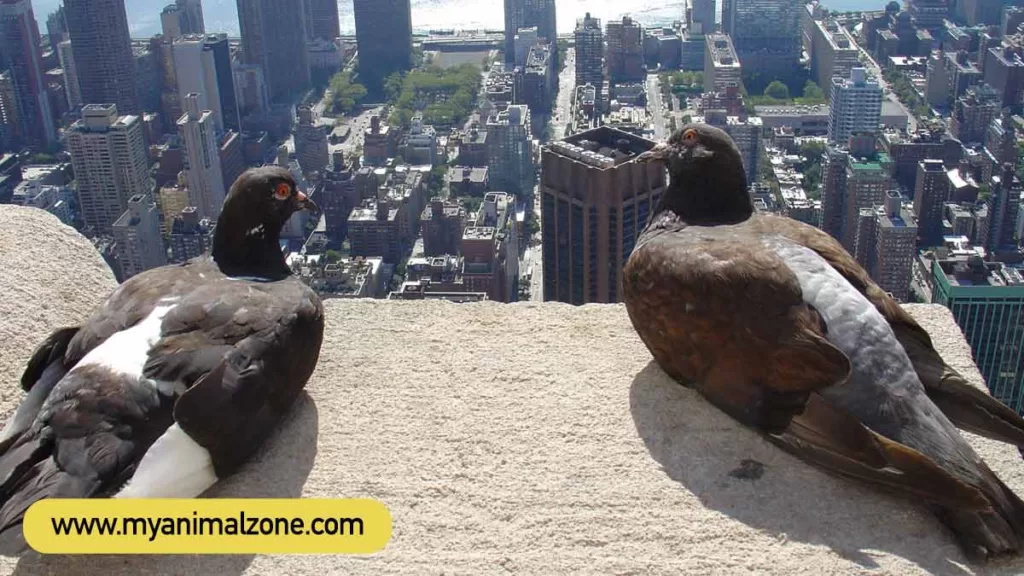Why Do Pigeons Make Noise in the Morning? This is a question that many people who live in urban areas may ask themselves as they are woken up by the cooing and chattering of pigeons outside their windows. Pigeons are common in cities and other urban areas, and their behavior and communication can be fascinating to observe. In this article, we will explore the reasons behind why pigeons make noise in the morning, including the various factors that can contribute to this behavior. We will also discuss the communication and behavior of pigeons in more detail, providing a deeper understanding of these remarkable birds.
Pigeon Biology
To understand why pigeons make noise in the morning, it is important first to understand some basic facts about pigeon biology. Pigeons are birds; as such, they have several anatomical and physiological differences from humans. For example, pigeons have excellent vision and can see ultraviolet light and detect polarized light. They also have a keen sense of hearing and a strong sense of smell.
Pigeon Communication
Like many animals, pigeons communicate with each other through a combination of vocalizations and body language. Pigeon vocalizations include cooing, grunting, and throaty growls, which are used for a variety of purposes, including courtship, aggression, and alarm calls. Body language is also an important aspect of pigeon communication, with postures and movements conveying information about social status and intent.
Environmental Factors

A number of environmental factors can influence pigeon behavior, including natural and urban environments, weather, and human influence. Pigeons are adaptable birds, and they can be found in a wide variety of habitats, from rocky cliffs to city streets. However, urban environments in particular can have a significant impact on pigeon behavior, as we will discuss later in this article.
Circadian Rhythms
Circadian rhythms are biological rhythms that follow a roughly 24-hour cycle, and they are an important aspect of many animals’ behavior. Pigeons are no exception, and their circadian rhythms can influence when they are active and when they sleep. This is important to keep in mind when considering why pigeons make noise in the morning.
Dawn Chorus
One of the most common reasons for bird noise in the morning is the dawn chorus. This is a natural phenomenon in which many species of birds, including pigeons, sing loudly at dawn. The purpose of the dawn chorus has yet to be completely understood, but it is thought to play a role in mate attraction, territorial defense, and synchronization of circadian rhythms.
Reproductive Behaviors
Breeding is an important aspect of pigeon behavior, and it can have a significant impact on their noise levels. During breeding season, which can vary depending on the species and location, male pigeons will engage in courtship displays and vocalizations to attract mates. This can be especially noisy in urban environments, where pigeons may be competing for limited resources.
Feeding Behaviors
Feeding is another important aspect of pigeon behavior, and it can also contribute to their noise levels. Pigeons are opportunistic feeders, meaning they will eat a wide variety of foods, including seeds, grains, and human scraps. In urban environments, where food sources may be plentiful, pigeons can become especially noisy as they compete for resources.
City Living
Urban environments can have a significant impact on pigeon behavior. In cities, pigeons may have access to abundant food sources, but they may also face more competition for those resources. Additionally, urban environments can be noisy and crowded, which can influence pigeon communication and behavior.
Pigeons and Human Society
Pigeons have a long history of interaction with humans, and they have been bred and domesticated for various purposes throughout history. Despite this, pigeons are often seen as pests in urban environments, and many people dislike them for their noise and mess. However, it is important to remember that pigeons are wild animals and should be treated with respect and care.
Read More
Conclusion
In conclusion, the question of Why Do Pigeons Make Noise in the Morning can be answered by understanding the various factors contributing to their behavior. Pigeons’ circadian rhythms, breeding behaviors, feeding behaviors, and environmental factors all affect their communication and vocalizations. Additionally, living in urban environments can impact pigeon behavior and communication. By gaining a deeper appreciation for the complexities of pigeon behavior, we can better understand and coexist with these remarkable birds. Whether we view them as pests or appreciate them for their beauty, it is clear that pigeons are an important part of our urban ecosystem. So the next time you hear pigeons making noise in the morning, take a moment to appreciate their unique communication and behavior.
FAQs
Q: Are pigeons loud all day or just in the morning?
A: Pigeons can make noise at any time of the day, but they are often most vocal in the morning during the dawn chorus and during breeding season.
Q: How do pigeons communicate with each other?
A: Pigeons communicate with each other through a combination of vocalizations, body language, and visual cues.
Q: Why do some people consider pigeons to be pests?
A: Pigeons are often considered pests because they can create messes and damage buildings with their droppings, and they can also be noisy and aggressive in urban environments.
Q: Can pigeons be trained to do tricks like other birds?
A: Yes, pigeons can be trained to perform various tricks and tasks, and they have been used for various purposes throughout history, including as messengers and performers.
Q: Are there any health risks associated with pigeons?
A: Pigeons can carry diseases that can be transmitted to humans through their droppings, so it is important to take precautions when handling or cleaning up after them.

